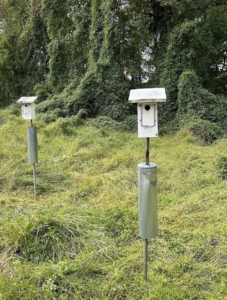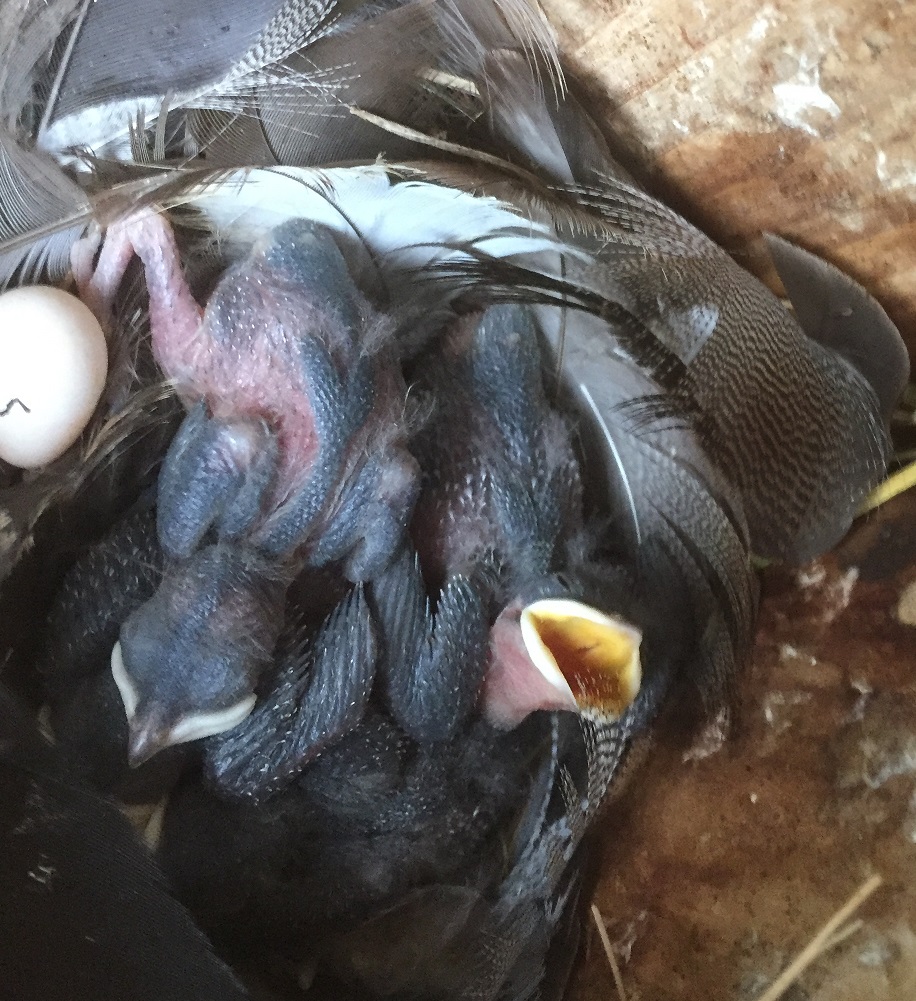Despite Predation, Bluebirds at Langley Fork Park Endure
Tree Swallow Residents of Box 11 (June 22, 2023). The tree swallows would generally survive better than their bluebird competitors at Langley Fork Park in 2023.
Article and photos by FMN Stephen Tzikas
As Bluebird Trail Monitoring Leader at Langley Fork Park in McLean, I have been trying to optimize the environment for the bluebirds at the park. The trail monitoring team and former trail leader all help in the effort, so I am fortunate to have their assistance.
In 2021 we nurtured 63 total protected birds which included 26 bluebirds. In 2022 we had 57 total protected birds which included 24 bluebirds. In 2023 we had 49 protected birds of which 14 were bluebirds. This can be contrasted to the five years prior to that in which Langley Fork Park monitoring succeeded with about 40 protected birds per year which included about five bluebirds a year. Our efforts in the recent past are successful compared to the longer historical record.
Were it not for the loss of 14 bluebird eggs in 2023, the count could have been 28 bluebird fledglings. That would have been larger than the 2021/2022 counts. All but one of the bluebird eggs were loss to predation. On the other hand, all but one of the seven unhatched tree swallow eggs were part of clutch sizes that also included fledglings. The solitary tree swallow egg in a Box 11 attempt was overcome by an ant infestation. Another year of snakes at Box 7 resulted in five tree swallow nestlings being devoured. Consequently Box 7 has been moved, as was Box 9, that had four bluebird eggs vanish. Indeed Box 7 was also attacked by a snake last year. There aren’t any overhead trees in the area, and we maintained the grass so no large weeds could provide a pathway for snakes. Nonetheless, it seems snakes can be skillful predators traveling up the bluebird pole and baffle.
As for a solution at the end of the season, we paired Box 7 with Box 4, as pairing boxes can provide

Box Pairing Experiment at Langley Fork Park. Boxes 5 and 9 in the photograph are spaced approximately 10 feet apart, as are Boxes 4 and 7.
positive outcomes when good park locations for boxes spaced more than 100 yards apart are limited. This solution was used for Box 9 too, as it seems the birds didn’t care for all the playing field activity around Box 9’s former location. Box 9 is now paired with Box 5. This will be an interesting experiment.
Bluebirds are territorial, so two pairs generally won’t nest in boxes that are closer than 100 yards. Though, boxes in pairs might attract a different species, like tree swallows. Tree swallows compete with other species such as bluebirds, as well as their own species. Tree swallow pairs will compete, sometimes to their deaths, with each other for nest sites. Male tree swallows will claim a bird box and guard it, in hopes of attracting a female tree swallow. Consequently there is a strange dynamic ensuing. By installing boxes in pairs, they will be close enough that both boxes are unlikely to be occupied by the same species, but just plentiful enough to allow for another species without an aggressive competition between the two species. This strategy has worked on bluebird trails. There are different recommendations on how far apart to place the pairs, from on the same pole to as much as 24 feet apart. We placed our two pairs at about 10 feet.
Status of 2022 Changes
The start of the 2023 monitoring season incorporated some changes recommended in 2022. Our team agreed that moving Boxes 1, 4, 7, 9 might help the bluebirds. The data showed that Boxes 1, 2, 5, and 9 never had bluebirds. We also had the opportunity to add an 11th bluebird box which was installed.
- Box 1 was moved closer to the parking lot to get more attention by the bluebirds. As a result of the move, the box produced 3 bluebird and 5 tree swallow fledglings.
- Box 4 has had occasions of broken eggs from intense competition. Moving it from the corner of the field to a more bushy area closer to some benches improved it. In 2023 this box produced 5 tree swallow fledglings.
- Box 7 had a snake predator in 2022, but it was not under any trees and the weeds around it were cut. We decided to leave it in place at the last moment in 2022. Unfortunately in 2023 it was once again attacked by snakes. No fledglings survived. To avoid that mistake again, Box 7 is now paired in a good location for the upcoming 2024 season.
- Box 9 was moved a few yards farther from the human activity at this playing field area. Yet in in 2023 this box did not produce any fledglings and four bluebird eggs went missing. It is now paired in a better location for the upcoming 2024 season.
Finally, something should be said of unhatched eggs, which for the most part is uncontrollable. Unhatched eggs could be a result of issues related to temperature, humidity, infertility, environmental chemical use, or physical damage to the eggshells. Sometimes too, if the female bird is inexperienced, or if there is not enough food nearby and she has to leave the nest frequently to forage, the eggs can be affected negatively.




